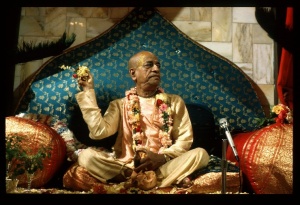CC Madhya 15.83: Difference between revisions
m (1 revision(s)) |
No edit summary |
||
| Line 1: | Line 1: | ||
{{ | [[Category:Sri Caitanya-caritamrta - Madhya-lila Chapter 15|C083]] | ||
<div style="float:left">'''[[Sri Caitanya-caritamrta|Śrī Caitanya-caritāmṛta]] - [[CC Madhya|Madhya-līlā]] - [[CC Madhya 15|Chapter 15: The Lord Accepts Prasādam at the House of Sārvabhauma Bhaṭṭācārya]]'''</div> | |||
<div style="float:right">[[File:Go-previous.png|link=CC Madhya 15.82|Madhya-līlā 15.82]] '''[[CC Madhya 15.82|Madhya-līlā 15.82]] - [[CC Madhya 15.84|Madhya-līlā 15.84]]''' [[File:Go-next.png|link=CC Madhya 15.84|Madhya-līlā 15.84]]</div> | |||
{{CompareVersions|CC|Madhya 15.83|CC 1975|CC 1996}} | |||
{{RandomImage}} | |||
==== TEXT 83 ==== | ==== TEXT 83 ==== | ||
<div | <div class="verse"> | ||
sei bhite hāta diyā phala paraśilā | :sei bhite hāta diyā phala paraśilā | ||
kṛṣṇa-yogya nahe, phala apavitra hailā | :kṛṣṇa-yogya nahe, phala apavitra hailā | ||
</div> | </div> | ||
| Line 12: | Line 16: | ||
==== SYNONYMS ==== | ==== SYNONYMS ==== | ||
<div | <div class="synonyms"> | ||
sei | ''sei bhite''—on that ceiling; ''hāta diyā—''touching your hand; ''phala''—the fruits; ''paraśilā—''touched; ''kṛṣṇa-yogya nahe—''is not fit to be offered to Kṛṣṇa; ''phala''—the fruits; ''apavitra hailā—''has become contaminated. | ||
</div> | </div> | ||
| Line 19: | Line 23: | ||
==== TRANSLATION ==== | ==== TRANSLATION ==== | ||
<div | <div class="translation"> | ||
“‘After touching the ceiling above the door, you have touched the coconuts. Now they are no longer fit to be offered to Kṛṣṇa because they are contaminated.’ | “‘After touching the ceiling above the door, you have touched the coconuts. Now they are no longer fit to be offered to Kṛṣṇa because they are contaminated.’ | ||
</div> | </div> | ||
| Line 26: | Line 30: | ||
==== PURPORT ==== | ==== PURPORT ==== | ||
<div | <div class="purport"> | ||
Śrīla Bhaktisiddhānta Sarasvatī Ṭhākura states that Rāghava Paṇḍita was not simply a crazy fellow suffering from some cleansing phobia. He did not belong to the mundane world. In lower consciousness, accepting something to be spiritual when it is actually material is called bhauma ijya-dhīḥ. Rāghava Paṇḍita was an eternal servant of Kṛṣṇa, and everything he saw was related to the service of the Lord. He was always absorbed in the transcendental thought of how he could always serve Kṛṣṇa with everything. Sometimes neophytes, devotees on the lower platform, try to imitate Rāghava Paṇḍita on the platform of material purity and impurity. Such imitation will not help anyone. As explained in the Caitanya-caritāmṛta (Antya-līlā 4.174), bhadrābhadra-vastu-jñāna nāhika ‘prākṛte.’ On the transcendental platform there is no higher or lower, pure or impure. On the material platform, distinction is made between good and bad, but on the spiritual platform everything is of the same quality. | Śrīla Bhaktisiddhānta Sarasvatī Ṭhākura states that Rāghava Paṇḍita was not simply a crazy fellow suffering from some cleansing phobia. He did not belong to the mundane world. In lower consciousness, accepting something to be spiritual when it is actually material is called ''bhauma ijya-dhīḥ''. Rāghava Paṇḍita was an eternal servant of Kṛṣṇa, and everything he saw was related to the service of the Lord. He was always absorbed in the transcendental thought of how he could always serve Kṛṣṇa with everything. Sometimes neophytes, devotees on the lower platform, try to imitate Rāghava Paṇḍita on the platform of material purity and impurity. Such imitation will not help anyone. As explained in the [[Sri Caitanya-caritamrta|''Caitanya-caritāmṛta'']] ([[CC Antya 4.174|Antya-līlā 4.174]]), ''bhadrābhadra-vastu-jñāna nāhika ‘prākṛte.’'' On the transcendental platform there is no higher or lower, pure or impure. On the material platform, distinction is made between good and bad, but on the spiritual platform everything is of the same quality. | ||
:‘dvaite’ bhadrābhadra-jñāna, saba—‘manodharma’ | |||
:‘ei bhāla, ei manda’,—ei saba ‘bhrama’ | |||
“In the material world, conceptions of good and bad are all mental speculations. Therefore, saying ‘This is good and that is bad’ is all a mistake.” ([[CC Antya 4.176]]) | “In the material world, conceptions of good and bad are all mental speculations. Therefore, saying ‘This is good and that is bad’ is all a mistake.” ([[CC Antya 4.176]]) | ||
</div> | </div> | ||
__NOTOC__ | |||
<div style="float:right; clear:both;">[[File:Go-previous.png|link=CC Madhya 15.82|Madhya-līlā 15.82]] '''[[CC Madhya 15.82|Madhya-līlā 15.82]] - [[CC Madhya 15.84|Madhya-līlā 15.84]]''' [[File:Go-next.png|link=CC Madhya 15.84|Madhya-līlā 15.84]]</div> | |||
__NOTOC__ | |||
__NOEDITSECTION__ | |||
Revision as of 16:16, 5 September 2021

A.C. Bhaktivedanta Swami Prabhupada
TEXT 83
- sei bhite hāta diyā phala paraśilā
- kṛṣṇa-yogya nahe, phala apavitra hailā
SYNONYMS
sei bhite—on that ceiling; hāta diyā—touching your hand; phala—the fruits; paraśilā—touched; kṛṣṇa-yogya nahe—is not fit to be offered to Kṛṣṇa; phala—the fruits; apavitra hailā—has become contaminated.
TRANSLATION
“‘After touching the ceiling above the door, you have touched the coconuts. Now they are no longer fit to be offered to Kṛṣṇa because they are contaminated.’
PURPORT
Śrīla Bhaktisiddhānta Sarasvatī Ṭhākura states that Rāghava Paṇḍita was not simply a crazy fellow suffering from some cleansing phobia. He did not belong to the mundane world. In lower consciousness, accepting something to be spiritual when it is actually material is called bhauma ijya-dhīḥ. Rāghava Paṇḍita was an eternal servant of Kṛṣṇa, and everything he saw was related to the service of the Lord. He was always absorbed in the transcendental thought of how he could always serve Kṛṣṇa with everything. Sometimes neophytes, devotees on the lower platform, try to imitate Rāghava Paṇḍita on the platform of material purity and impurity. Such imitation will not help anyone. As explained in the Caitanya-caritāmṛta (Antya-līlā 4.174), bhadrābhadra-vastu-jñāna nāhika ‘prākṛte.’ On the transcendental platform there is no higher or lower, pure or impure. On the material platform, distinction is made between good and bad, but on the spiritual platform everything is of the same quality.
- ‘dvaite’ bhadrābhadra-jñāna, saba—‘manodharma’
- ‘ei bhāla, ei manda’,—ei saba ‘bhrama’
“In the material world, conceptions of good and bad are all mental speculations. Therefore, saying ‘This is good and that is bad’ is all a mistake.” (CC Antya 4.176)